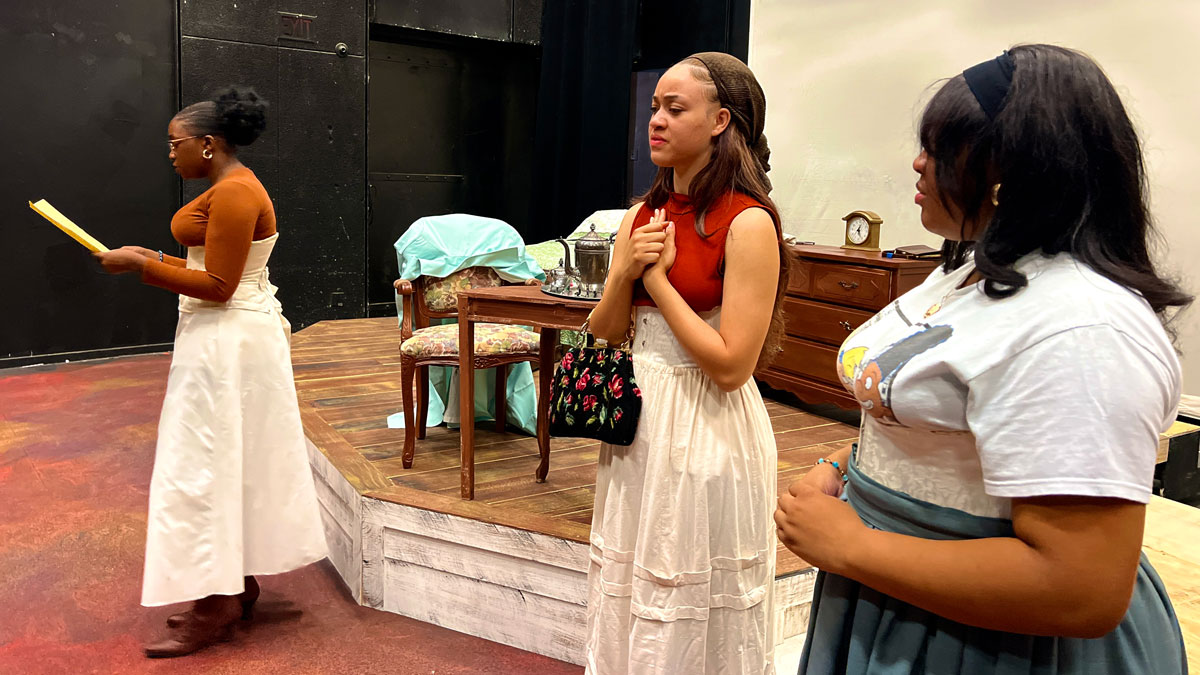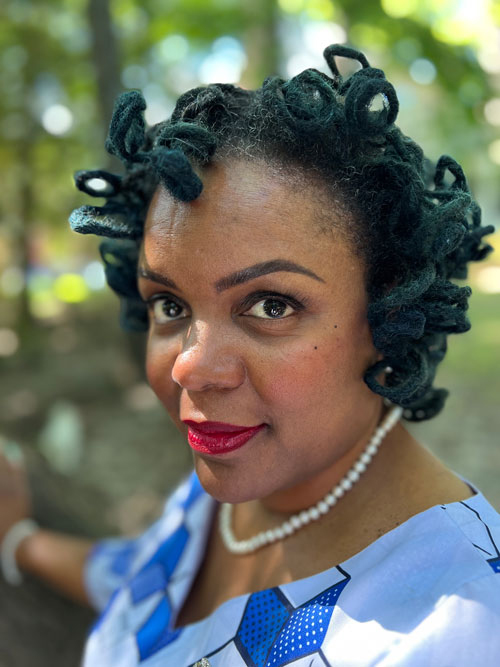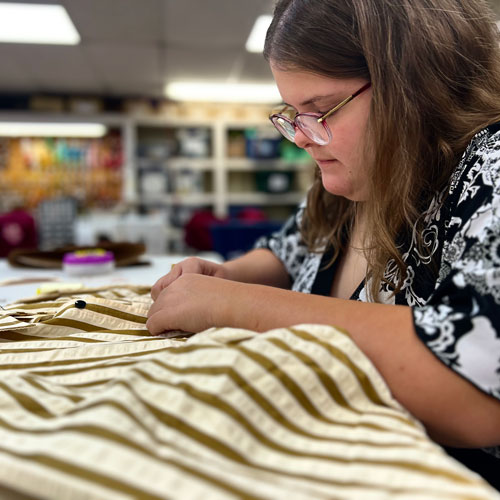
Top: SIU Carbondale musical theater students Kaitlin Rose (Julia), Malia Jones (Mattie) and Israeli Jones (Lula) rehearse for the upcoming School of Theater and Dance production “Wedding Band.” Bottom: Theater student Faith Smothers works on costumes. (Photos provided)
November 20, 2023
‘Wedding Band’ at SIU to challenge audiences on racism, class and unjust laws
CARBONDALE, Ill. — “Wedding Band,” the provocative and unsparing story of interracial love set against the backdrop of World War I in Charleston, South Carolina, will play out in the intimacy of Southern Illinois University Carbondale’s Christian H. Moe Laboratory Theater starting Nov. 30.
The drama by acclaimed playwright and novelist Alice Childress of a decade-long romance between a Black seamstress and white baker who cannot legally marry, is presented by SIU’s School of Theater and Dance and the Office of Anti-Racism, Diversity, Equity and Inclusion. Performances are at 7:30 p.m. Nov. 30, Dec. 1-2 and Dec. 7-9, and 2 p.m. Dec. 3 and Dec. 10.
“Part of our mission is to challenge audiences and to challenge our performers and to use theater as a mirror on the world,” said H.D. Motyl, associate professor and director of the School of Theater and Dance. “This is a play that takes place in 1918. It was written by a Black woman playwright in the early 1960s. And here we are in 2023, and some of the issues that are in the play we are still dealing with.”
The two-act production includes a content warning: “’Wedding Band’ is set in 1918 South Carolina, a time and place in history when laws banning interracial marriage were firmly in place. This play frankly explores themes of race and class and questions the devastating impact of unjust laws on ordinary human lives. Explicit racist language and actions are depicted and described throughout the play.”
More work to do
 Omiyẹmi (Artisia) Green, a professor of theater and Africana studies at the College of William & Mary, is guest director. The play “demands a brave production team” along with an approach “that is imbued with an ethic of care.”
Omiyẹmi (Artisia) Green, a professor of theater and Africana studies at the College of William & Mary, is guest director. The play “demands a brave production team” along with an approach “that is imbued with an ethic of care.”
“Here is a group of people in 1918 — both Black and white — who are not swallowing their words. It is one thing to read ‘Wedding Band’ as a literary exercise,” Green said. “It is a completely different matter to produce ‘Wedding Band’ in an age of cancel culture, growing student accessibility needs, changes in theater industry practices, anti-Blackness, xenophobia, state-sanctioned violence, the growing oppression of women’s rights, the repeal of affirmative action and successive years of a charged political landscape.”
Using care with students
Green emphasized that since the start of rehearsals, she has been careful in her work with the students, including developing a “production community agreement” to govern conduct and approach toward using racist and prejudicial language. The cast starts rehearsals with an affirmation by the female vocal ensemble, Beautiful Chorus, as an “an exercise to warm up the voice and establish value of our common ground.” Similar work is also part of each rehearsal’s closing exercise as the students get out of character so they can “reaffirm that while their respective characters may say things to one another or about one another that cut deeply, the only things they as student actors believe in and are embodying in the here and now is joy, love, empathy, compassion and understanding — attributes of the ‘everything’ required to be an actor and tell someone else’s story.”
“We acknowledge that the work we are doing is emotionally and psychologically taxing,” Green said. “But the Moe Theater is a safe space in which to do this work, and when we are with one another, we feel peace.”
Ensemble is ‘a gift’
Green praises the work of the entire ensemble which features first-semester musical theater freshmen Kaitlyn Rose (Julia) and Seth Worthington (Herman) in “huge and deeply complex roles.”
“The actors take directions well,” Green said. “They are thoughtful and compassionate humans, in touch with their respective inner songs. They have eccentric personalities and overall bring me a lot of joy.”
Green steers away from the use of a lead or supporting actor, which she said is a “uniquely American or Western concept rooted in individualism.”
 “Childress is writing out of the Black theatrical tradition, which is grounded in community and how the collective evolves because of the pressure placed on it,” she said. “Thus, Julia and Herman can only self-actualize because of their relationship with the others.”
“Childress is writing out of the Black theatrical tradition, which is grounded in community and how the collective evolves because of the pressure placed on it,” she said. “Thus, Julia and Herman can only self-actualize because of their relationship with the others.”
Timothy J. Jones, whose work has been seen on stage throughout the country, including the Chesapeake Shakespeare Company, American University and St. Louis Black Rep, is guest scenic designer. Jen Helms, a graduate master’s student in theater will be using the performances for her thesis in costume design, and Jaemin Park, assistant professor, lighting and sound design, School of Theater and Dance, is in charge of lighting.
Intimate setting
Seating for each of the performances over the eight-day engagement is limited, so audiences are encouraged to get their tickets early. The 100-seat theater works well for a production that “demands intimacy,” Green said.
“But more importantly, this play in this space poses a wonderful educational challenge to the ensemble, many of whom are used to performing in the McLeod,” Green said. “You can’t hide in the Moe. It’s like performing on camera. It demands intentionality and focus. As far as the audience, they are guests in this backyard, and they are in for an up-close and surround-sound experience.”
There will be a talkback featuring Green, Paul Frazier (SIU Carbondale’s vice chancellor for anti-racism, diversity, equity and inclusion) and cast members following the Nov. 30 performance.
Tickets available
Tickets are $20 for adults, $18 for senior citizens, and $8 for students 17 and under or who have an SIU ID. Tickets can be purchased by phone (618-453-6000), in person at the McLeod Theater or Banterra Center box offices, or online. McLeod Theater box office hours for performances will be 12:30-4 p.m. Monday through Friday, Nov. 27 to Dec. 1 and Dec. 4-8, and also one hour before curtain. Banterra Center ticket office hours are 9 a.m. to 4:30 p.m. Monday through Friday.
Beer and wine from the university’s Fermentation Science Institute will be served at cash only bars in the lobby before performances and during intermission.
‘Make yourself at home’
Having lived in Illinois before returning to Virginia, Green said she was “thrilled” with Motyl’s offer to direct the production. Returning to Illinois “is a full-circle moment for me,” said Green, recalling Motyl’s words when she arrived in August to “make yourself at home because you are at home.”
“I’ve worked at four universities in my career, and no one has ever said, ‘Omiyẹmi, make yourself at home because you are at home.’ It was a profound moment for me,” Green said. “The other point I will credit to Alice Childress and the strong Black women of my lineage working through Professor Motyl to say, ‘Do as Julia does over the play’s course, and that is clearly, calmly and resolutely define your place wherever you are.’”
